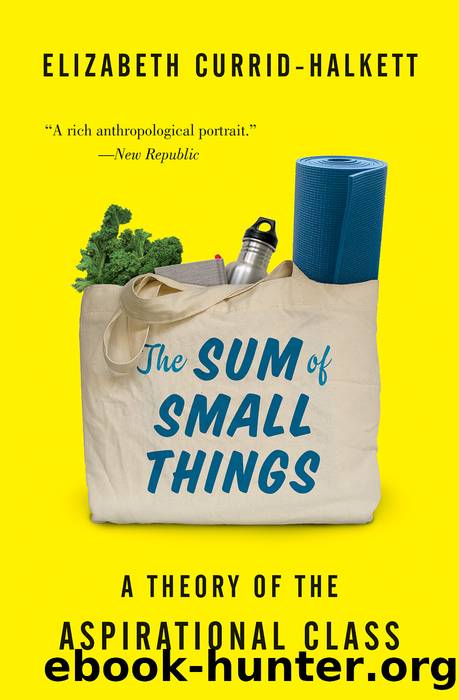The Sum of Small Things by Elizabeth Currid-Halkett

Author:Elizabeth Currid-Halkett
Language: eng
Format: epub
Publisher: Princeton University Press
Published: 2017-07-14T16:00:00+00:00
“ETSY’S INDUSTRIAL REVOLUTION”
As Whole Foods made organic a global, mass market phenomenon, Etsy enabled artisanal goods to go mainstream. Etsy, established in 2004, is a sort of Ebay for artisans selling handmade boots, candles, jewelry, belts, paper goods, and pretty much any other product so long as it conforms to the company’s production standards. Founded in 2005 in Brooklyn (of course), Etsy is what is called a peer-to-peer e-commerce company where members can buy and sell crafts, craft materials, and artisanal goods in their “Marketplace” arranged under a wide array of choices such as weddings, birthdays, men, women, and jewelry. Vintage goods are also sold (but must be at least 20 years old). More prolific and industrious sellers can open their own “shop” which sells a variety of different handmade and vintage goods, of which Etsy gets 20 cents for every listing and 3.5% of the sale price (most goods are sold for $15 to $20). The average seller is a college-educated woman in her twenties or thirties. Initially, Etsy only allowed handmade goods, but more recently (and despite criticism by the diehards), the company allowed producers to work with some small artisanal manufacturers provided the relationship is direct and it is still people rather than companies selling things. This revision of rules is a matter of practicality: As a marketplace, Etsy has become more successful than its producers can handle, and to actually fulfill consumer orders more hands (or machines, as it turns out) are needed. The proof is in the numbers. In 2010, Etsy generated $180 million in sales, and by the next year that figure jumped to $314 million.19 In 2012, Etsy generated $895 million in sales; by 2013 that number was $1 billion. In 2014, the company boasted $2 billion in sales. In April 2015, Etsy went public with an IPO of $16 a share but opened at $31 a share. Yet despite these clearly capitalistic moves, the company aims to keep its philosophy and raison d’être in place. Etsy is still about the “life stories of the sellers,” as The Economist put it in a profile of the company. For Etsy, its triumph is in the hands of consumers not producers, the former of which care an awful lot about where things come from and who made them.20 Today, other than its billion-dollar sales figures, Etsy boasts a membership of more than 50 million registered users who are happily making or buying handmade goods from all around the world and unique versions of mainstream consumer goods.
Download
This site does not store any files on its server. We only index and link to content provided by other sites. Please contact the content providers to delete copyright contents if any and email us, we'll remove relevant links or contents immediately.
Nudge - Improving Decisions about Health, Wealth, and Happiness by Thaler Sunstein(7709)
The Fire Next Time by James Baldwin(5447)
iGen by Jean M. Twenge(5417)
Adulting by Kelly Williams Brown(4576)
The Sports Rules Book by Human Kinetics(4388)
The Hacking of the American Mind by Robert H. Lustig(4383)
The Ethical Slut by Janet W. Hardy(4258)
Captivate by Vanessa Van Edwards(3840)
Mummy Knew by Lisa James(3693)
In a Sunburned Country by Bill Bryson(3543)
The Worm at the Core by Sheldon Solomon(3487)
Ants Among Elephants by Sujatha Gidla(3467)
The 48 laws of power by Robert Greene & Joost Elffers(3293)
Suicide: A Study in Sociology by Emile Durkheim(3024)
The Slow Fix: Solve Problems, Work Smarter, and Live Better In a World Addicted to Speed by Carl Honore(3010)
The Tipping Point by Malcolm Gladwell(2927)
Humans of New York by Brandon Stanton(2873)
Get What's Yours for Medicare: Maximize Your Coverage, Minimize Your Costs by Philip Moeller(2742)
Handbook of Forensic Sociology and Psychology by Stephen J. Morewitz & Mark L. Goldstein(2705)
